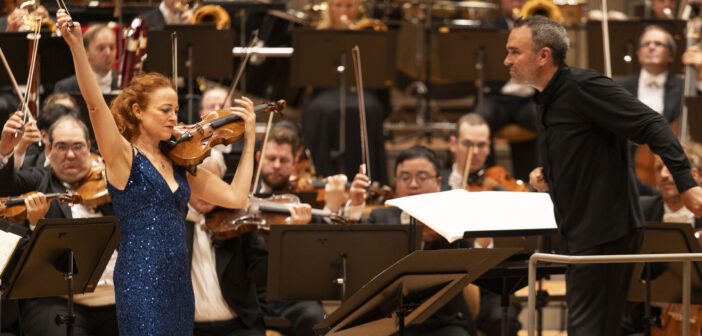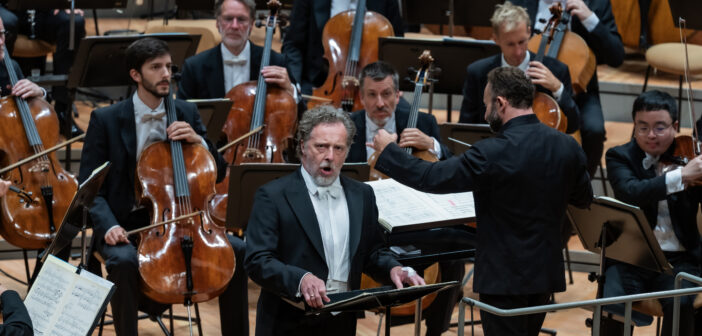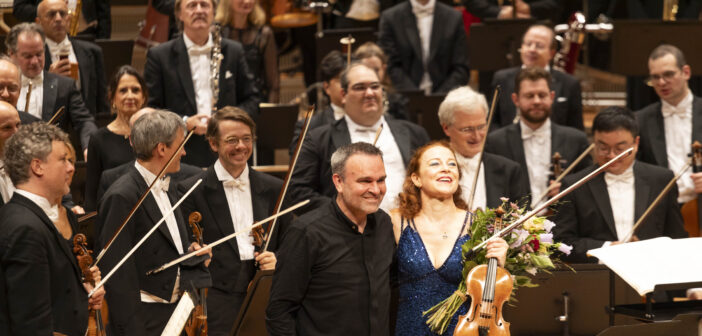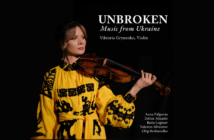Musikfest Berlin is a late summer festival which you’re unlikely to see on the same culture vulture circuit that includes Salzburg, Bayreuth, Aix-en-Provence, and Munich. Dedicated to large-scale classical orchestras, Musikfest Berlin presents the world’s top ensembles which this year included the Royal Concertgebouw Orchestra, as well as the London and Boston Symphony Orchestras. It also showcases premier German bands including the host city’s Berlin Philharmonic, Berlin Radio Symphony Orchestra, Konzerthausorchester Berlin and Staatskapelle Orchestra and from further afield, the Bavarian State Orchestra and Munich Philharmonic.
While there’s plenty of the bread and butter repertoire on the docket–Mahler, Strauss, Rachmaninoff, Mendelssohn–the festival is dedicated to newer works, twentieth-century repertoire, and in 2023, traditional Persian music. The programs do not pander, and still, attracted more than respectable crowds. My sense was that this festival enjoys an intensely engaged local following with only a smattering of tourists and audience members from outside Berlin.
I arrived about half-way through the three-week festival, missing most of the more ‘international’ guests, allowing me to focus on the truly astonishing array of ‘local’ orchestras, each showcased in ambitious programs requiring huge forces, and virtuoso solo and ensemble playing.
I heard all of the Musikfest concerts at Berlin’s Philharmonie which celebrates its 60th anniversary this fall. The hall has a huge significance in Berlin’s post-war history, representing decades of lobbying and fundraising to build a new home for the Berlin Philharmonic. The resultant structure opened in 1963 at what was then the far eastern edge of West Berlin, but is now at the heart of the reunified city. It’s hard to speak about any of the ensembles that play here without also mentioning the superb acoustics. One is endlessly treated to sound that is indeed warm, but always clear and never boomy. The hall is a modern miracle of the acoustician’s art.
My first concert at the Philharmonie (Sept. 8) had a Canadian connection with Orchestre symphonique de Montréal Music Director Rafael Payare leading Staatskapelle Berlin. As a side note, I heard the same orchestra a couple nights later at their home theatre, the Berlin State Opera house, in a performance of Verdi’s Don Carlo. Likewise, on Sept. 11, the ‘pit band’ of Munich’s Bavarian State Opera played at the festival under their music director, Vladimir Jurowski. Unlike in North America where we tend to draw a hard line between symphonic and opera orchestras, these elite opera ensembles are not confined to the pit, but regularly present in their own concert series, on tour and at home.
Under Payare, Staatskapelle Berlin opened their program with Unsuk Chin’s “Concerto for cello and orchestra” (2006-2008/2013) played by the conductor’s wife, Alisa Weilerstein. The American cellist compelled even when executing the work’s seemingly ‘simple’ drone effects, while also achieving stunning quiet tones in her instrument’s highest register. The orchestra matched the soloist’s virtuosity with its own armoury of extended techniques including creepy, exaggerated glissandi, and hands slithering up and down open strings.
In Mahler’s Symphony No. 5, Payare and the Staatskapelle conveyed the huge range of sounds and emotions contained within the massive work starting with the hair-raising introduction of the funeral march in the first movement, right through the symphony’s playful waltz rhythms and grandly-scaled, contrapuntal finale. The fourth section, the “Adagietto”, happens to be Mahler’s most famous music. Often over sentimentalised, Payare stopped short of losing momentum, with just enough rallentando to evince ecstasy.
German conductor, composer and virtuoso clarinettist Jörg Widmann led the Berlin Philharmonic on Sept. 9 in a bracing program featuring his own concert overture “Con brio” (2008), “Fantasie” for clarinet (1993) and Violin Concerto No. 2 (2018) as well as Mendelssohn’s “Reformation”, Symphony No. 5. The concerto was written for his sister Carolin Widmann who was the evening’s soloist. She mastered its fiendish demands for extended technique which included percussive batting of the strings, unpitched straight tone and exaggerated glissandi. The Widman siblings reveled in the work’s eclecticism, offering Romantic, czardas-twinged melodies and a comic, frenzied finale with prominent xylophone. Together with Chin’s work for cello the previous evening, it’s clear the ‘grand concerto’ is still a viable form with the ability to thrill, especially in the hands of composers who can simultaneously mine the past as they create their own unique sound worlds.

Carolin Widmann, Jörg Widmann and the Berlin Philharmonic at Philharmonie Berlin. Photo: Frederike van der Straeten
Widmann obviously believes in old chestnuts like Mendelssohn’s “Reformation” symphony. With appropriately pared-down Berlin Phil forces, he coaxed an exquisite, dynamically wide-ranging performance. The famous “Dresden Amen” theme emerged from the quietest hushed tones and the second movement’s dance rhythms were inspired by the conductor’s likewise informal demeanour on the podium. There wasn’t a hint of fustiness or pomposity in this reading despite its sombre Calvinist underpinnings.
The first out-of-town orchestra I heard was Munich’s Bavarian State Orchestra under their general music director, Vladimir Jurowski. Once again the program was a mix of new and old, including Ukrainian composer Victoria Vita Polevá’s Symphony No. 3 (2003), Berg’s “Concerto for violin and orchestra” (1935) and Strauss’s “Alpine Symphony” (1899-1915). Polevá’s work showcases extensive sostenuto passages from which exquisite melodies emerge in the winds and trumpet in particular. The second movement builds to a roof-raising climax eliciting a warm ovation for which the composer was present (as were all the creators of the newer works throughout the festival). Russian-born Jurowski deserves credit for showcasing the work of a living Ukrainian composer in the current political climate.
Norwegian violinist Vilde Frang joined the orchestra for the Berg, his last completed work steeped in quotations from Bach chorales and Carinthian folk song. Inspired by the early death of Manon Gropius at age 18 (she was the daughter of Alma Mahler and Walter Gropius), Frang seized upon its yearning, dare I say, ‘melodic’ fragments while attacking its more agitated sections with gusto.
Strauss’s gargantuan symphony throws in every instrument but the kitchen sink–wind machines, all manner of chimes, booming organ, phalanxes of offstage horns… Jurowski has a long association with the work, having recorded it with the London Philharmonic Orchestra. With his excellent forces, he raised the Philharmonie’s roof, as well as a few goosebumps, with the symphony’s heroic, reiterating theme. The Munich horn section was particularly outstanding, and in general, the musicians visibly engaged with each other, clearly loving every moment. A festival highlight without a doubt.
The following evening featured a different Munich-based ensemble, the Munich Philharmonic Orchestra under Mirga Gražinytė-Tyla in another monumental masterpiece of Germanic Romanticism, Mahler’s Symphony No. 2, “The Resurrection” (1888-1894). With its deep questioning of the meaning of life, death and the afterlife, a good performance can be transformative…and this one was. From its opening death march through its lighter menuet and Ländler dance tunes to its massive choral finale, Gražinytė-Tyla elicited the gamut of effects and emotions contained within its 80 minute frame.
In the final section, a seated Munich Philharmonic Choir began “O glaube, mein hertz” (“Oh believe, my heart”) in the quietest of tones, unleashing their full power as they dramatically stood, section by section, to rejoice in the promise of eternal life. Previously, mezzo-soprano Okka von der Damerau delivered a full-throated “Urlicht” with its moving plea to be with God. During the choral section, she was joined in duet by soprano Talise Trevigne whose fresh, lyric tone carried beautifully over the huge forces.
The only non-German ensemble I heard was Collegium Vocale Gent on Sept. 13 under their legendary founder, Philippe Herreweghe in Bach’s Mass in B Minor (1733, 1748/49). The concert made me reflect on the profound influence the great Baroque master had on subsequent German composers given the Bach quotations I had just heard in the Berg concerto, and Mendelssohn and Mahler symphonies. Herreweghe and the orchestra and choir he founded have been at the forefront of the period music movement for over 50 years. As is traditional with Bach’s monumental treatment of the texts of the Catholic mass, soloists perform with the chorus, each emerging for their featured solos and duets. The starriest name among these was soprano Dorothee Mields, one of the leading interpreters of Baroque vocal repertoire on today’s scene. She offered purity of tone and pitch, and a somewhat perplexing cheeriness no matter what text she was interpreting. Most impressive was countertenor Alex Potter who delivered his solos with rich, penetrating tone and deep expression.

Christian Gerhaher, Kirill Petrenko and the Berlin Philharmonic at Philharmonie Berlin. Photo: Bettina Stöß
The Berlin Philharmonic returned for a second Musikfest appearance for three concerts of cutting edge 20th and 21st-century repertoire led by their artistic director, Kirill Petrenko (heard Sept. 15). They opened with Iannis Xenakis’ “Jonchaies” (1977) in which a threnody of string sound dominated, punctuated by pizzicati from the violins and huge, rolling thunder sounds on the timpani. Momentum was further built with bouncing, propulsive syncopation between drums, violins and tuba. The first half also featured the world premiere of Budapest-born Márton Illés’ “Lég-szín-tér” (“Air-colour-space”) which conjured all manner of bird noises from the violins, harp and woodwinds. A disciple of German composer Wolfgang Rihm and fellow Hungarian György Kurtág, Illés’s musical language is challenging, inviting some isolated booing, quickly drowned out by competing cheers.
Baritone Christian Gerhaher joined the orchestra in the second half for Hartmann’s “Gesangsszene” (1962/1963) composed during the era of the nuclear arms race and the Cold War, set to texts from Jean Giraudoux’s stage play Sodom and Gomorrah. After an extended orchestral introduction, the baritone soloist begins a long, vocally demanding lamentation that resonates as strongly today as it must have in the early 1960s. He sings of a society which, despite being at its “peak of talent”, has still managed to destroy the environment and start mass wars. Gerhaher enunciated the text with the clarity and intention one would expect of a celebrated Lieder singer, while still delivering a big enough sound to dominate the dense orchestration. The concert ended with Kurtág’s “Stele” (1993/1994) whose final section offered a deeply contemplative conclusion to the program.
This challenging, entirely contemporary Berlin Philharmonic program epitomises the raison d’être of Musikfest Berlin: to offer the public the latest, cutting-edge classical music alongside repertoire staples, albeit, works that are among the most grand of that ilk. All the concerts I saw were extremely well-attended despite repertoire that, as a North American concert-goer, would not be considered big box office. To hear all these major, mostly German, ensembles over such a concentrated period was thrilling and kudos must go to the Berliner Festspiele, the presenting umbrella organisation whose aim is to platform unique works and artists using the most varied approaches and working methods.
https://www.berlinerfestspiele.de/en/musikfest-berlin















